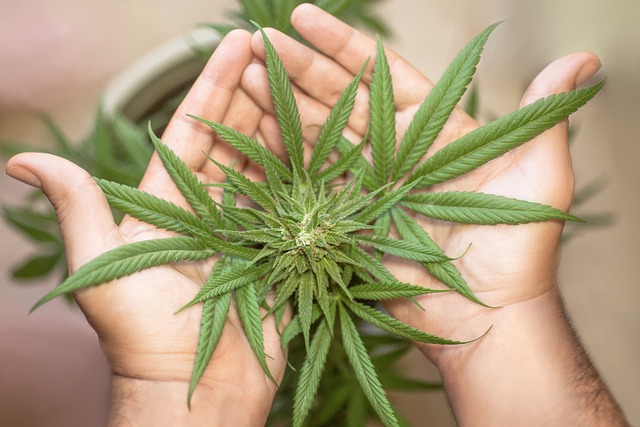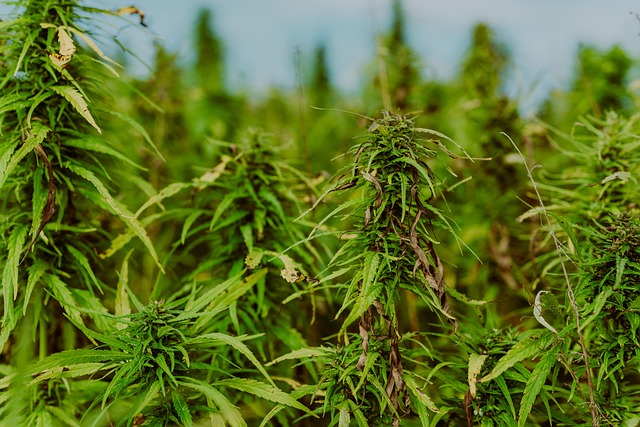Δ9-tetrahydrocannabinolic acid (THCA), a non-psychoactive cannabinoid found abundantly in raw cannabis and THCA flower, has gained attention for its anti-inflammatory properties. Research suggests that THCA interacts with the endocannabinoid system's CB2 receptors to alleviate inflammation, making it a potential alternative for managing various health issues associated with inflammation. Beyond its anti-inflammatory effects, THCA flower is also being studied for its analgesic and neuroprotective potential, which may stem from its ability to modulate inflammatory and pain pathways by inhibiting specific cytokines and enzymes. This positions THCA flower as a noteworthy natural health solution and complementary therapy for targeting inflammation and its associated symptoms. For those interested in the benefits of THCA, it's crucial to source high-quality, potent THCA flowers from reputable suppliers who practice organic cultivation to ensure higher concentrations of THCA and maintain product safety and efficacy. Users should be aware of proper dosage for optimized effects, considering personal sensitivity, strain potency, and individual body chemistry. The anti-inflammatory properties of THCA flower can be experienced through various consumption methods like vaporizing or edibles; however, it's important to note that the compound converts to THC when exposed to heat, altering its effects. As with any supplement, consulting a healthcare professional before incorporating THCA flower into a health regimen is advisable, especially if used alongside other medications or supplements.
Exploring the therapeutic potential of THCA flower, this comprehensive guide delves into the myriad ways it can be incorporated into natural health routines for its renowned anti-inflammatory effects. From understanding how to select high-quality THCA flowers to mastering their dosage and optimal storage, readers will gain insightful knowledge on leveraging this cannabinoid’s full potential. We’ll navigate the science behind THCA’s health benefits, explore its entourage effect with other cannabinoids, and provide best practices for decarboxylation. Additionally, we’ll cover legal considerations, user experiences, comparisons to other cannabinoids, and the latest research on this burgeoning field. Join us as we unravel the secrets of THCA flower and its role in promoting well-being through its anti-inflammatory properties.
- Unlocking the Potential of THCA Flower: An Overview
- The Science Behind THCA's Anti-Inflammatory Properties
- Sourcing Quality THCA Flowers for Optimal Benefits
- Understanding THCA Flower Dosage and Usage Guidelines
Unlocking the Potential of THCA Flower: An Overview

Delta-9-tetrahydrocannabinolic acid (THCA) is a non-psychoactive cannabinoid found abundantly in raw cannabis plants, including THCA flower. This compound has garnered attention for its potential therapeutic properties, one of which is its anti-inflammatory effect. Studies have indicated that THCA may interact with the body’s endocannabinoid system, particularly the CB2 receptors, to exert anti-inflammatory effects. This could be beneficial for individuals seeking natural ways to manage inflammation associated with various health conditions.
The anti-inflammatory properties of THCA flower are not its sole attribute. Research suggests that THCA may also possess analgesic and neuroprotective qualities, further expanding its potential applications. These effects are believed to stem from the compound’s ability to inhibit key pro-inflammatory cytokines, enzymes, and receptors involved in pain and inflammation pathways. As such, THCA flower is a subject of growing interest for those exploring natural remedies or complementary approaches to wellness, particularly where inflammation and related symptoms are concerned.
The Science Behind THCA's Anti-Inflammatory Properties

Delta-9-tetrahydrocannabinolic acid (THCA) is the non-psychoactive precursor to the well-known cannabinoid, delta-9-tetrahydrocannabinol (THC). Found abundantly in raw cannabis flowers, THCA has garnered attention for its potential health benefits, with a significant focus on its anti-inflammatory effects. Scientific studies indicate that THCA interacts with the body’s endocannabinoid system through two primary receptors: CB1 and CB2. These interactions modulate inflammatory responses by inhibiting pro-inflammatory cytokines, such as tumor necrosis factor-alpha (TNF-α) and interleukin-6 (IL-6), which are key drivers of inflammation within the body. Furthermore, THCA’s anti-inflammatory properties may be due to its ability to activate certain immune cells while suppressing others, thus restoring balance and reducing excessive inflammatory reactions. This selective regulation by THCA suggests a promising avenue for therapeutic applications in conditions characterized by chronic inflammation, such as arthritis and autoimmune disorders.
Sourcing Quality THCA Flowers for Optimal Benefits

When exploring the potential benefits of THCA flowers, sourcing high-quality, potent materials is paramount for optimizing their anti-inflammatory effects. THCA, or Tetrahydrocannabinolic Acid A, is the raw form of THC found in cannabis plants and has been studied for its therapeutic properties. Reputable suppliers who specialize in premium, organic cultivation practices are more likely to produce flowers with higher concentrations of THCA, ensuring a more potent and effective product. It’s crucial to research and select suppliers with a proven track record of producing consistent and high-quality THCA flowers. These suppliers often provide detailed information about their growing conditions, testing results, and the specific strains they offer, which can guide consumers in making informed decisions. By prioritizing quality and reliability when sourcing THCA flowers, individuals can better harness their potential anti-inflammatory effects for wellness purposes. Always verify the supplier’s credentials, lab test results, and adherence to industry regulations to ensure the safety and efficacy of the THCA flowers you choose.
Understanding THCA Flower Dosage and Usage Guidelines

When incorporating THCA flower into one’s wellness routine, it’s crucial to grasp the appropriate dosage and usage guidelines to maximize its anti-inflammatory effects. Tetrahydrocannabinolic acid (THCA), the raw form of THC found in cannabis plants, is renowned for its potential therapeutic properties, including pain relief and anti-inflammatory benefits. To experience these advantages, users should consider starting with a low dose to gauge individual sensitivity. A typical dosage might range from 1 mg to 5 mg of THCA per use, but this can vary greatly depending on an individual’s body chemistry and the specific effects desired. It’s also important to note that THCA flower effects can be influenced by various factors such as strain potency, the user’s metabolism, and tolerance levels.
For those new to THCA, it is recommended to begin with a small amount and wait for its effects before considering an increase in dosage. Consumption methods such as vaporizing or ingesting edibles can affect absorption rates, and thus the onset and intensity of effects. Users should also be aware that THCA can convert to THC when exposed to heat or when decarboxylated, which changes its effects profile. Therefore, it’s essential to follow specific usage guidelines tailored to one’s needs and to consult with a healthcare professional before integrating THCA flower into any health regimen, especially if combining with other medications or supplements. Adhering to these guidelines can help users safely explore the potential therapeutic properties of THCA flower, particularly its anti-inflammatory effects.
THCA flower tips hold significant promise for those seeking natural anti-inflammatory relief. This article has delved into the multifaceted nature of THCA, elucidating its potential and how to harness it effectively. From understanding its scientific basis to sourcing quality products, and setting appropriate dosages, readers are now equipped with a comprehensive overview of THCA flower’s anti-inflammatory effects and how to use it responsibly for optimal benefits. As the body of research continues to grow, so too does the appreciation for this natural compound. It is clear that THCA flowers have a valuable role in health and wellness routines, offering a potential alternative to conventional treatments. With informed decision-making and responsible usage, individuals can explore the advantages of THCA flower as part of their holistic approach to well-being.
